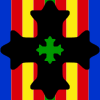Mark A. Gabriel
| Part of a series on |
| Criticism of religion |
|---|
| By religion |
| By religious figure |
| By text |
| Religious violence |
| Related topics |
Mark A. Gabriel, is a writer on Islamic affairs who lives in the United States. He is the author of five books critical of Islam, including Islam and the Jews: The Unfinished Battle and Journey into the Mind of an Islamic Terrorist. His real identity has been questioned.[1]
Biography
| Part of a series of articles on the |
| Modern persecution of Coptic Christians |
|---|
 |
| Overviews |
| Massacres |
|
|
| Incidents |
| Figures |
In his first book written in 1997, Against the Tides in the Middle East: The true story of Mustafa, former teacher of Islamic history Gabriel tells of his birth on 30 December 1957 to Muslim parents in Upper Egypt. He explains that his birth name was Mustafa. His parents, wealthy owners of a clothing factory, as well as his six brothers and one sister, were all devout Muslims.
According to his own book, Mustafa grew up immersed in Islamic culture and was sent to Al Azhar school at the age of six. By the time he was twelve years of age he claims that he completely memorized the Qur'an.[2] According to Gabriel, after graduating from Al-Azhar University with a Master's degree in 1990, with a graduation thesis on The reign of the heir over the Islamic kingdom in the period of Ammaweya, he was subsequently offered a position as a lecturer at the university.[3] During his research, which involved travel to Eastern and Western countries, Mustafa became more distant from Islam. In his book, he wrote about his view of Islam stating:
| “ | [I found Islam's history] from its commencement to date, to be filled with violence and bloodshed without any worthwhile ideology or sense of decency. I asked myself "What religion would condone such destruction of human life?" Based on that, I began to see that the Muslim people and their leaders were perpetrators of violence." | ” |
On hearing that Mustafa had "forsaken Islamic teachings", the authorities of Al Azhar expelled him from the University on 17 December 1991, and asked for him to be released from the post of Imam in the mosque of Anas Ebn Malek in the city of Giza. The Egyptian secret police then seized Mustafa and placed him in a cell without food and water for three days, after which he was tortured and interrogated for four days before being transferred to the Khalifa prison in Cairo. He was released without charge a week later. Following these events, Mustafa lost his faith and went to work as a sales director in his father's factory. However, after a year of reflection on religious texts and discussions with a Christian woman, he "gave his heart to Jesus".[5]
On 4 August 1994, Mustafa was sent by his father to South Africa to establish connections in the clothing materials business. In Durban, he met a Christian family from India with whom he stayed for three days and lived a Christian life for the first time. After returning to Cairo, Mustafa wore a Christian crucifix around his neck for ten days before his father noticed it and demanded an explanation. Mustafa explained: "I received Jesus Christ as my God and Saviour, and I pray for you and the rest of my family to also accept Jesus Christ as your Saviour".[6] Mustafa writes that his father collapsed, but on recovering cried out to his other sons saying: "Your brother is a convert! I must kill him today!". Mustafa escaped to his sister's house. On 28 August 1994, he traveled through Northern Egypt, Libya, Chad and Cameroon, finally stopping in the Congo, where he was struck down by malaria. Following a "miraculous recovery from certain death", Mustafa left the hospital five days later "to tell the people everywhere what Jesus did for him in Africa".[7]
Mustafa subsequently changed his name, taking the Christian name of Mark Gabriel.
Works
| Wikiquote has quotations related to: Islam and Terrorism |
- Against the Tides in the Middle East, International Academic Centre for Muslim Evangelism in South Africa, 1997 (published under the name "Mustafa").
- Islam and Terrorism: What the Qur'an really teaches about Christianity, violence and the goals of the Islamic jihad. 2002, ISBN 0-88419-884-7
- Islam and the Jews: The Unfinished Battle. 2003, ISBN 0-88419-956-8
- Jesus and Muhammad: Profound Differences and Surprising Similarities. 2004, ISBN 1-59185-291-9
- Journey into the Mind of an Islamic Terrorist. 2006, ISBN 1-59185-713-9
- Culture Clash: Islam's War on America. 2007, ISBN 978-1-59979-212-5
- Coffee with the Prophet: 21st Century Conversations with Muhammad. 2008, ISBN 978-0-61520-728-5
See also
Notes
- ↑ Kidd, Thomas S. (2013). American Christians and Islam: Evangelical Culture and Muslims from the Colonial Period to the Age of Terrorism. Princeton University Press. p. 149. ISBN 9780691162300. Retrieved 25 January 2016.
- ↑ Mustafa, 1997, p. 9.
- ↑ Mustafa, 1997, p. 19.
- ↑ Mustafa, 1997, p. 20-21.
- ↑ Mustafa, 1997, p. 54.
- ↑ Mustafa, 1997, p. 60.
- ↑ Mustafa, 1997, p. 75.